- Home
- Joan Lowery Nixon
The Haunting
The Haunting Read online
Praise for
The Haunting
An ALA Quick Pick
“Nixon creates a spooky setting fairly dripping in atmosphere, then spins an ever-tightening thread of tension.” —Kirkus Reviews
“The plot keeps readers guessing until the end.“ —School Library Journal
Books by Joan Lowery Nixon
FICTION
A Candidate for Murder
The Dark and Deadly Pool
Don’t Scream
The Ghosts of Now
Ghost Town: Seven Ghostly Stories
The Haunting
In the Face of Danger
The Island of Dangerous Dreams
The Kidnapping of Christina Lattimore
Laugh Till You Cry
Murdered, My Sweet
The Name of the Game Was Murder
Nightmare
Nobody’s There
The Other Side of Dark
Playing for Keeps
Search for the Shadowman
Secret, Silent Screams
Shadowmaker
The Specter
Spirit Seeker
The Stalker
The Trap
The Weekend Was Murder!
Whispers from the Dead
Who Are You?
NONFICTION
The Making of a Writer
This is a work of fiction. Names, characters, places, and incidents either are the product of the author’s imagination or are used fictitiously. Any resemblance to actual persons, living or dead, events, or locales is entirely coincidental.
Text copyright © 1998 by Joan Lowery Nixon
Cover photograph copyright © Getty Images
All rights reserved. Published in the United States by Delacorte Press, an imprint of Random House Children’s Books, a division of Random House, Inc., New York. Originally published in hardcover by Delacorte Press, New York, in 1998.
Delacorte Press is a registered trademark and the colophon is a trademark of Random House, Inc.
Visit us on the Web! randomhouse.com/ts
Educators and librarians, for a variety of teaching tools, visit us at RHTeachersLibrarians.com
Library of Congress Cataloging-in-Publication Data is available upon request.
ISBN 978-0-385-32247-8 (trade) — eISBN: 978-0-307-43391-6 (ebook)
Random House Children’s Books supports the First Amendment and celebrates the right to read.
v3.1
For Allyson,
who introduced me
to Louisiana’s ghost
Contents
Cover
Other Books by This Author
Title Page
Copyright
Dedication
Chapter One
Chapter Two
Chapter Three
Chapter Four
Chapter Five
Chapter Six
Chapter Seven
Chapter Eight
Chapter Nine
Chapter Ten
Chapter Eleven
Chapter Twelve
Chapter Thirteen
Chapter Fourteen
Chapter Fifteen
Chapter Sixteen
About the Author
CHAPTER ONE
My fingers shook as I pushed back the long strands of hair that had fallen over my face. I peered at the pale, shriveled ninety-six-year-old woman who lay in a coma in the hospital bed.
The sound—was it a whisper?—came again. This time I could see the colorless lips move.
Holding my breath, I edged forward in the wobbly plastic chair. I was ready to jump to my feet and run. I had better find Mom and Grandma. Great-grandmother Sarah was waking up.
I stretched out a hand to the edge of her bed, steadying myself. Slowly and quietly I began to rise.
Suddenly Sarah’s deep brown eyes opened and she stared at me. Her knobby fingers clamped around my wrist so tightly that it hurt. “Don’t go, Anne.” It sounded like an order. In a voice as raspy as a fingernail on a blackboard, she managed to utter, “I have something important to tell you.”
I took a deep breath, my pounding heart banging loudly in my ears. “I—I’m not my mom—that is, Anne,” I stammered. “It’s—Lia. Anne’s daughter. Mom’s down in the hospital cafeteria with Grandma. They asked me to sit with you. Mom and I came to San Francisco because you’ve been in a coma, and …”
I knew I was babbling and it felt as if, as usual, I was doing everything all wrong. I begged, “If you’ll let go of me I’ll run and get Mom. Grandma, too.”
But Sarah didn’t seem to hear. Her gaze didn’t waver as she stared into my eyes. “Be quiet, Anne,” she insisted. “Listen to me.”
I realized that Great-grandmother hardly knew me, so I didn’t blame her for not recognizing me. But I didn’t look like Mom. I didn’t look like Grandma. I didn’t look the way I was supposed to look at all.
I thought of the long line of strong women from whom I had descended. Tall, big-boned, and handsome, with dark hair and brown eyes, my maternal ancestors had stepped into the world with pride and courage and had accomplished amazing things.
Then there was me.
I couldn’t count how often I’d heard Grandma Augusta say, “Speak up, Lia, so people can hear you. And for goodness’ sakes get that hair out of your eyes. It looks like you’re hiding behind a curtain.”
Sometimes Grandma would sigh dramatically, sadly shake her head, and say to my mother, “Look at the child, Anne. She’s no bigger than a minute and all that pale hair—where did it come from? She’s not a bit like any of the women in our family. If I hadn’t been on hand at the hospital when she was born, I might start believing in changelings.”
My mom wasn’t as blunt, but sometimes she agreed with Grandma. “It’s good to be a reader, but, Lia, your nose is always in a book. Don’t you want to do things? You need to meet people. Have more fun.”
I always gave the same answer, wondering if Mom would even notice. “I am having fun. Reading is fun.”
“You’re fifteen. You need to have friends.”
“I have a friend. A best friend. Jolie.”
“I mean lots of friends so you can do some fun things.”
“Why should I have lots of friends? I like being with Jolie.”
Periodically Grandma and Mom would get so stirred up they’d start a What to Do About Lia project. I’d be signed up for lessons. The worst of all was when they wanted me to go to cheerleading camp. I found it easier to just go along, pay no attention to the other kids—who took the classes with great enthusiasm—and keep doing my own, untalented best. Within two or four weeks the lessons would be over and Jolie and I could go back to exploring the unlimited wonders of our Metairie, Louisiana, branch library. We’d have sleepovers at which we’d read awesome and horrifying ghost stories to each other.
My great-grandmother Sarah’s grip on my arm weakened, and she lay back against her pillow. Her eyelids, like brittle, yellowed paper, slowly slid shut. “I have to let you know about Graymoss, Anne,” she said. “And I haven’t much time or energy to speak—listen to me.”
Not knowing what else to do, I muttered, “I’m listening.” With a scared, sick feeling, I faced the fact that there might not be time to go for Mom.
“You do know about Graymoss, don’t you?” Sarah asked. Her eyelids fluttered open again, and she looked as if she were begging me to answer yes.
“Graymoss. Yes, I know a little about it,” I replied.
Actually, I’d discovered the existence of Graymoss two years before, when I was thirteen and I had been looking through some old family albums. I’d held up a pencil sketch of a large, graceful two-story house with verandas upstairs and down. Its roof was supported by rows of
tall, white Ionic columns.
“What’s this place in the picture?” I asked Mom. “The one where someone’s written at the bottom ‘Graymoss Plantation, 1831.’ ”
Mom had leaned over my shoulder to study the sketch. “Graymoss was the Blevinses’ plantation home. That date must refer to the year it was built,” she said.
“This is where the famous Charlotte Blevins lived!” I said. I’d been told often about Charlotte Blevins—my great-great-great—who had lived on Graymoss plantation as a child with her parents and grandparents. In 1861, during the War Between the States, Charlotte’s parents and grandmother died. Later, when Charlotte was only sixteen, a detachment of the Union Army marched through that part of Louisiana, looting and burning many of the large plantation houses. Charlotte’s grandfather was killed, but somehow Charlotte was able to persuade a Union officer to spare her home. It wasn’t burned or destroyed like most in the area.
Charlotte proceeded to grow up and establish a school to teach former slaves and their children to read and write. She was a strong-minded, courageous woman who headed a long line of strong-minded, courageous women.
“What happened to Graymoss after the Civil War?” I’d asked.
Mom had shrugged. “I have no idea. Like many of those old plantations, it probably deteriorated years ago.”
I never liked that answer. It didn’t satisfy me. In my mind I visualized a deeply green lawn rolling from the back veranda down to the Mississippi River, like the lawns at Oak Alley and some of the other well-kept plantation houses. Graymoss would be a quiet, peaceful place with big rocking chairs on the veranda, and when a light breeze blew, it would ruffle the pages of the book I was reading.
I waited for Sarah to continue with her words about Graymoss. I realized that if anyone in the family knew the answer to my question about the fate of Graymoss, she’d be the one. I asked abruptly, “Great-grandmother, what happened to Graymoss?”
Sarah shuddered, and a strange, fearful look came into her eyes. She took a deep breath and seemed to be trying to gather strength, but her voice wavered as she answered, “Graymoss is there. It’s waiting.”
My heart jumped. “You mean it? Really? Graymoss is still standing?”
Sarah closed her eyes again, but she continued to speak rapidly. “Listen to me, Anne. I’m leaving Graymoss to you and not to Augusta. Augusta is headstrong and adamant about what should be done with Graymoss. If Augusta had her way Graymoss would be torn down. I can’t let that happen. My attorney understands the provisions of Charlotte’s will … and mine. We must continue to protect the house … and care for it. We have no choice.”
Sarah’s voice grew so low and soft that I had to lean close to hear her.
“Someone has actually cared for the house all these years?” I asked.
“Yes. There is a trust that takes care of taxes, repairs, expenses, and the caretaker’s salary.”
“I don’t understand,” I told her. “If the house is still standing and is in good condition, then why hasn’t anyone in the family ever lived in it?”
Sarah sighed. Her lips barely moved as she said, “Read Charlotte’s diary. Then you’ll know.”
“Know what, Great-grandmother? What will I know?”
“Read the diary.”
“Where is the diary? Where will I find it?”
For just an instant Sarah’s fingers tightened on my arm. “We must save Graymoss, but stay far away from it,” she said. “The house is haunted by a terrible, fearful evil.”
CHAPTER TWO
The door opened, and a nurse hurried into the room. “Move back, please,” she told me. “Quickly!”
Sarah’s fingers had gone limp, so I easily slid my arm from under her hand. Tripping, scrambling to one side, and dragging the chair with me, I managed to end up wedged into a corner near the door.
Another nurse arrived, pushing her way past Mom and Grandma, who had also arrived and were trying to get through the door at the same time.
“What happened?” Mom asked, her voice rising.
The first nurse turned to look at Mom. Then the nurse began turning off things and unfastening some of the tubes that had been attached to Sarah. “I’m sorry, Mrs. Starling,” she said. Then she nodded sympathetically at Grandma. “Mrs. Moore, there’s no longer a pulse … no heartbeat.”
Mom’s mouth opened and shut and opened again, but nothing came out. It was the only time I’d seen her at a loss for words.
Grandma’s voice broke as she whispered, “We didn’t have a chance to say a last goodbye.” A tear rolled down Grandma Augusta’s cheek, and I felt a terrible wave of sorrow. I shuddered to think how awful it would be, no matter how old you were, to lose your mother, and Sarah was Grandma’s mother.
“I’d hoped she’d wake,” Grandma Augusta said. She pulled a tissue from the pocket of her skirt and blew her nose loudly.
“She did,” I said.
Mom and Grandma turned to look at me.
“What did you say?” Grandma boomed. “Speak up, Lia. This is no time to whisper.”
I cleared my throat and took a step away from the corner. “I said—”
“Push your hair out of your eyes and tell us what happened.”
Tucking my hair behind my ears, I cleared my throat again and said, “Great-grandmother did wake up.” I looked at Mom. “She thought I was you, Mom. She kept calling me Anne.”
Mom got this disappointed, hurt expression on her face. “Why didn’t you come and get us, Lia?”
“I couldn’t.” I tried to explain. “She was holding my wrist.”
Grandma rolled her eyes. Then she reached down and stroked Sarah’s hand. “I see. She was stronger than you?”
The sarcasm in her words made me wince. “Yes,” I said. “She was.”
Mom sighed. “Lia, dear, why didn’t you press the call button for the nurse?”
“I didn’t think of it,” I whispered.
“She wanted to say goodbye,” Mom murmured, and she hugged Grandma.
One of the nurses, nudging and patting, managed to shoo us out of Sarah’s room and across the hallway into a small waiting room. “The doctor will be here soon,” she explained. “We’ll have some papers for you to sign.”
As soon as the nurse left, I managed to find the courage to say, “Great-grandmother didn’t want to say goodbye. She wanted to talk about Graymoss.”
“About Graymoss?” Mom looked surprised. “Was she hallucinating, Lia?”
“No,” I said. “She told me about the house, Mom. She said it was waiting.”
“That plantation house is still standing? It must be in terrible condition,” Mom said.
Grandma frowned and seemed uncomfortable. “I’m sorry Mother said anything about Graymoss. It’s a nasty place. When you were young and impressionable, Anne, I made Mother promise not to mention it to you.”
“Why?” Mom asked. Suddenly I felt uncomfortable watching my mother in the role of daughter.
“Because it’s not far from my home in Baton Rouge, so you’d insist on seeing the house. You know how curious you are. You’d have gone there, no matter what I said. You have to admit you would have.”
“Why shouldn’t I have seen the house?” Mom asked. She still sounded bewildered. “We could have visited Graymoss together.” Her eyes narrowed as she looked at Grandma. “You’ve visited Graymoss without me, haven’t you?”
“I did. Once,” Grandma admitted. “Once was enough. But it doesn’t matter, does it, because now it will be torn down, as it should have been years ago.”
I don’t know where I got the courage to say what had happened, but I did. “Great-grandmother said that Graymoss can’t be torn down. It has something to do with Charlotte Blevins’s will. Graymoss isn’t in terrible condition. All these years it has had a caretaker.”
“What? Did you know about this, Mother?” Mom asked Grandma, almost accusingly.
“Of course I knew,” Grandma said.
Mom slowly sho
ok her head. “I still can’t imagine why you wouldn’t tell me.”
“I had to keep you away from the house because … well, because it’s evil.”
Mom gave a surprised laugh as if she couldn’t believe what she’d just heard. “An evil house? That doesn’t sound like you, Mother. You’ve never been afraid of anyone or anything—human or beastie. ‘We don’t believe in ghosts,’ you used to tell me. But now you’re talking about an evil house?”
Grandma looked down at her lap. Her face was red, and little veins stood out in her forehead. “I know it sounds foolish,” she began, “and I don’t expect you to believe me—”
She looked so miserable that I interrupted. “I believe you, Grandma,” I said. “Because Great-grandmother said the very same thing. She said to take care of the house and protect it, but stay away from it because it was evil.”
The spark came back into Grandma’s eyes and she raised her head. “There! You see!” she crowed. “When all the legal folderol is over and the house is passed on to me, I’ll put an end to it, no matter what Charlotte requested. I’ll burn the fool house down.”
“You can’t,” I told her, and now it was my turn to blush as Grandma and Mom stared at me in amazement.
“What I mean is,” I told them, “Graymoss won’t be yours, Grandma. Great-grandmother Sarah told me she left the plantation to Mom.”
I sat through the memorial service for my great-grandmother Sarah Langley, trying not to fidget and wishing I could feel even a little sorrow at her passing.
The minister’s talk was filled with high praise for Sarah. He glowed as he described her great courage in ferrying planes from the United States to England during World War II. He glanced at the bronze memorial urn holding Sarah’s ashes and spoke in awed tones about her also risking her life to fly medical supplies into Alaskan villages and participating in a daring rescue of two mountain climbers, stranded during a blizzard.
I knew all that. I’d heard the stories over and over from Mom. It was Sarah herself I’d never gotten to know. Busy making news and winning awards until she grew too old to travel, she’d had no time to spend in Louisiana with a young great-granddaughter.

 The Internet Escapade
The Internet Escapade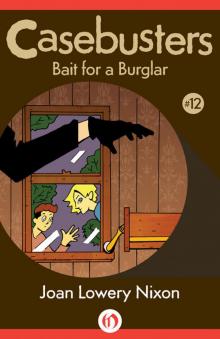 Bait for a Burglar
Bait for a Burglar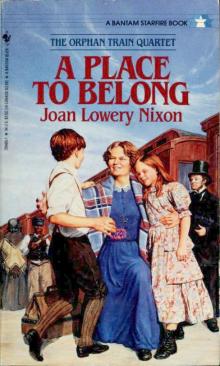 A Place to Belong
A Place to Belong Nightmare
Nightmare Sabotage on the Set
Sabotage on the Set The Other Side of Dark
The Other Side of Dark Whispers from the Dead
Whispers from the Dead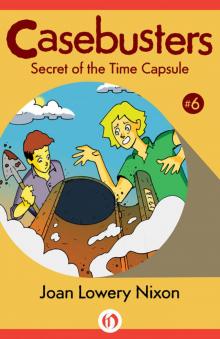 Secret of the Time Capsule
Secret of the Time Capsule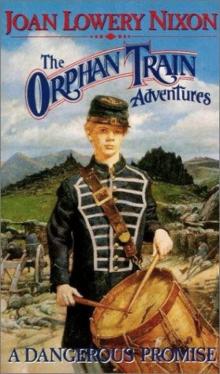 A Dangerous Promise
A Dangerous Promise Laugh Till You Cry
Laugh Till You Cry Spirit Seeker
Spirit Seeker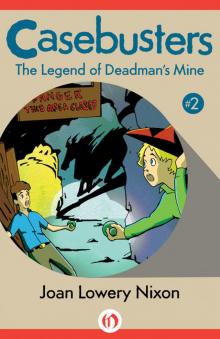 The Legend of Deadman's Mine
The Legend of Deadman's Mine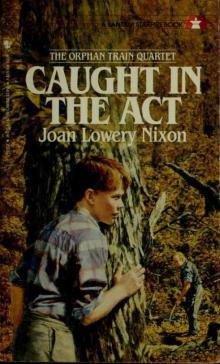 Caught in the Act
Caught in the Act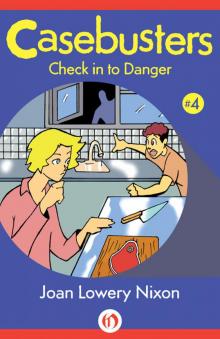 Check in to Danger
Check in to Danger Ellis Island: Three Novels
Ellis Island: Three Novels The Name of the Game Was Murder
The Name of the Game Was Murder The Haunting
The Haunting Lucy’s Wish
Lucy’s Wish Playing for Keeps
Playing for Keeps A Family Apart
A Family Apart Nobody's There
Nobody's There Shadowmaker
Shadowmaker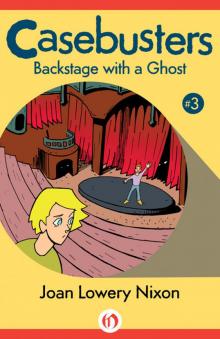 Backstage with a Ghost
Backstage with a Ghost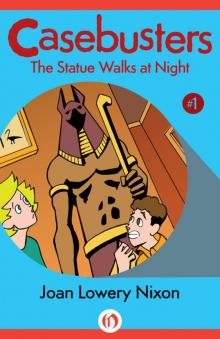 The Statue Walks at Night
The Statue Walks at Night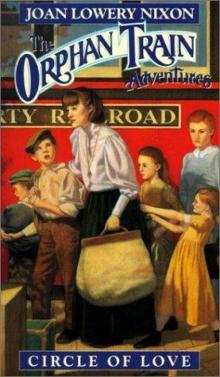 Circle of Love
Circle of Love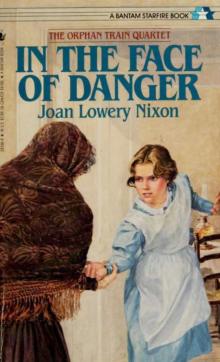 In the Face of Danger
In the Face of Danger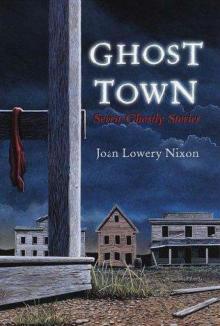 Ghost Town
Ghost Town A Candidate for Murder
A Candidate for Murder The Weekend Was Murder
The Weekend Was Murder The Island of Dangerous Dreams
The Island of Dangerous Dreams The Ghosts of Now
The Ghosts of Now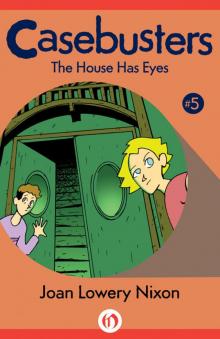 The House Has Eyes
The House Has Eyes The Dark and Deadly Pool
The Dark and Deadly Pool Keeping Secrets
Keeping Secrets Secret, Silent Screams
Secret, Silent Screams Beware the Pirate Ghost
Beware the Pirate Ghost Search for the Shadowman
Search for the Shadowman Haunted Island
Haunted Island